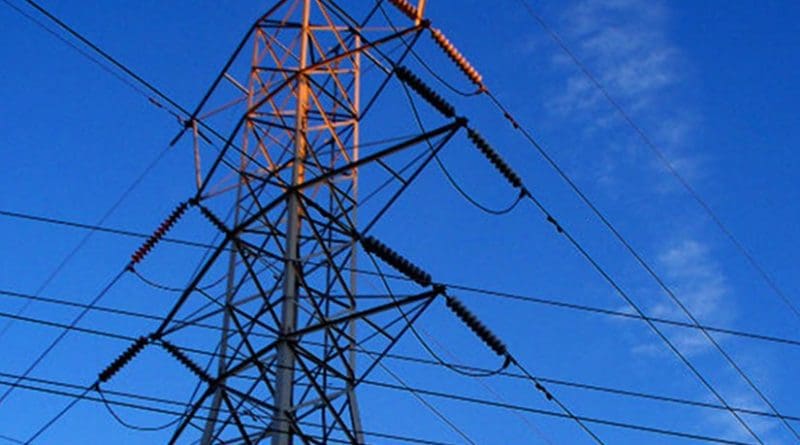Another US-Canadian Corporate Collaboration Silences Public Debate In US – Analysis
By Brian Frank*
The Northern Pass Transmission targets the state of New Hampshire.The media reports polls say 50% of New Hampshire opposes it.From Quebec, Canada to Concord, NH, you see only signs of opposition to Northern Pass. Bumper stickers against it in French are seen on the Canadian side. On the US side hundreds, perhaps thousands of hand-painted postersin English ‘Northern Pass Kiss my Ass’ and commercially printed ones in French‘Enterrez-le’ (Bury It) line the route south to Concord.A public referendum would kill the proposal. There’s been no talk of referendums.
Northern Pass is a collaboration between Boston-based Eversource Energyand Hydro-Quebec, the Quebec State Utilities. Their plan isto construct power lines from Quebec to Concord, NH cutting through 192 miles of NH forest.
In the NH media the arguments against it revolve around the environmental impacts and potential declines in real estate values and tourism. There are more fundamentalreasons not to allow Northern Pass but those have not been raised. Northern Pass is billed as ‘green energy’ because its 90% hydroelectric power. But ‘green’ implies more than simply hydroelectric. Green means sustainable. Regarding this criteria scrutiny of Northern Pass has been noticeably absent in the media. The Northern Pass model is archaic.
Robert Hebner, Director of the University of Texas/ Austin Center for Electomechanics says that transmitting thousands of megawatts long distances is a thing of the past.Smaller grids are the future and threat to big utility companies. The grid-expanding Eversource-HydroQuebec deal is a shrewdmaneuver to prevent losses in the face of a grid-break up.
Small grids are more logical. They are more sustainable, a better defense against climate change. A hotter climate means more storms and higher energy storms.In big grids millions lose power with a flood, a lightning strike, a power line downed by wind, snow or a tree. Heat wavesproduce extreme demand by millions resulting in brownouts and blackouts. Human operator erroron a big grid means millions lose power.
Hydro-Quebec is famous for power failures. For example, a1989 space storm that interrupted service at Hydro-Quebec caused outages in Quebec and in turn New York City affecting 6 million people for 9 hours. The there was the 1998 ice storm. It destroyed transmission towers and caused massive prolonged power outages in Quebec. In 1999 a wind storm downed Hydro-Quebec transmission lines. It cutting power to 600,000 people for over a week.In 2006 winds blow down Hydro-Quebec power lines. It left 450,000 without power.
The risks of big grids are well documented but absent from the debate on Northern Pass. Big grids fail big. Our experience with big gridsover the last 50 yearsis acomedy of errors. In 2003 fallen tree’s cut power to 8.5 million people in 17 states for two weeks people in Hurricane Sandy on the US’s east coast. In 2012, hundreds of millions lost power due to a surge in demand during a heat wave.In 2012 a wind storm cut power to 4.2 million customers in 11 states in the midwest for 10 days. In 2011 downed trees and wires caused a ten-day black out for three million customers in Mid-Atlantic states and New England. In 2011 hot weather and high demand after the end of the cause 12 hour outage , affecting 2.7 million people in Arizona and California which was importing power from Arizona. In 2003 two cables failed in London, and 250,000 customers lost power. In 2003 tree trimming caused a transmission line to short circuit. 50 million people- 10 million in Canada and 40 million in the US, were without power for four days. In 1998 lightning struck a Minnesota transmission line causing a separation of the northern Midwest from the Eastern grid. 52,000 people in upper Midwest, Ontario, Manitoba, and Saskatchewan lost power for 19 hours. In 1996 an Idaho transmission line overheated and sagged into a tree, which tripped relays to Wyoming coal plants. Two million people in the U.S., Canada, and Mexico lost power for minutes to hours. In 1996 inadequate tree trimming shorted-circuited Washington state transmission lines which tripped hydro turbines at an Oregon Dam. 7.5 million customers lost power in seven western U.S. states, two Canadian provinces, and Baja California, Mexico for up to six hours.In 1982 high winds knocked one transmission tower over causing a domino effect, as tower fell on tower. Five million people on the west coast lost power.In 1977 lightning struck several power lines shutting Indian Point No. 3 nuclear plant, causing power surges, overloads and disconnecting New York City from the North East grid. Nine million people in New York City lost power. Looting lasted for 26 hours. In 1965 a wrong setting on a transmission system device near Niagara Falls led to other human errors which lead to 30 million people losing power for 13 hours in the Central Northeast US and Ontario.
Terrorism is a bigger risk for bigger grids. Power failures can result from hacking. A Vermont electric utility was hacked by Russians. It was unaffected only because it was not connected to the bigger grid. In 2015 Kiev, Ukraine lost power as result of suspected Russian hacking.
It is irrelevant that Northern Pass makes no sense. There is a precedent here for senseless things happening. History is about to repeat itself. US and Canadian corporations will muscle Northern Pass though the same way the overwhelmingly unpopular Canadian Natural gas pipeline was muscled through. In VT they just dug it. They heck with permits.The corporate attitude was ‘let them stop us’. Maybe the term ‘leader of the free world’ refers to corporate freedom.
Source:
This article was published by Modern Diplomacy

